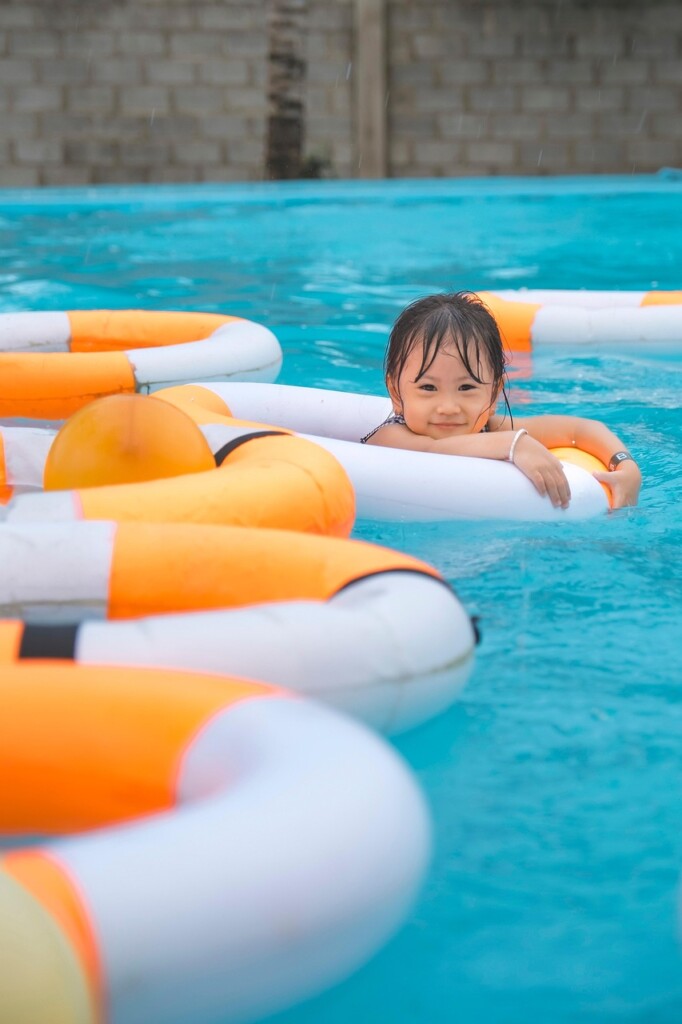THRIVE: Swim Lessons for Children with Autism

As parents, we take various measures to keep our children safe. Some safety precautions, like sunscreen and insect repellant, are apparent in the warm-weather months. But we must also consider the dangers associated with pools—and vacations that revolve around water.
A 2017 study from Columbia University’s Mailman School of Public Health revealed that children with autism are 160 times more likely to face drowning risks than the general pediatric population. This statistic was alarming, but it motivated me to prioritize water safety.
Parent and Child Bonding
For parents of autistic children, swim lessons can also be an opportunity for bonding. Parents can participate in early swim classes, share their child’s progress, and celebrate their wins.
Sensory Benefits
From the time he was little, my son would sit underwater for extended periods, which concerned me, but it never bothered him. I later realized that he loved the deep sensory input of the water, and being submerged had a more significant therapeutic effect on him than I realized. Water provides a gentle pressure that can be calming for many autistic children. Swimming can help regulate sensory input, improve focus, reduce anxiety, and promote calm and relaxation.
Safety and Drowning Prevention
Drowning is one of the leading causes of death for children with autism, as many are drawn to water but lack an understanding of its dangers. Swim lessons are critical in teaching water safety, helping autistic children navigate water and potentially save their lives.
Private Swim Lessons
Children with autism may experience sensory issues that hinder their understanding of information in group settings. One-on-one instruction is often a better option to help them feel comfortable in the water and to encourage them to submerge themselves.
Group Lessons
If your child is able to participate in a group class, they can use a tool we call modeling. This is particularly beneficial to children who have communication issues or a communication disorder because they can see other children doing what is being asked. Demonstrating a skill or technique with a peer can help your child grasp a concept that may otherwise find confusing.
Social Interaction and Communication
Swim lessons provide opportunities for children with autism to practice communication and follow instructions, which are important skills for both swimming and everyday life.
Structure and Routine
Many children with autism thrive in structured, routine-based settings. Swim lessons often follow a predictable routine, which can help autistic children feel comfortable and focused while learning.
The Right Fit
Charlotte has a variety of facilities and programs tailored to meet different requirements. Start by creating a list of important criteria for you and your child, like specialized services, learning environments, or driving distance. Keep in mind that swim lessons are a weekly commitment.
Reach out to these locations to ask about their offerings, availability, and how they can cater to your child’s needs. Ask about their staff qualifications, activities offered, and how they foster a supportive and engaging environment for children. Taking the time to understand what each place can provide will help you to make informed decision. Some of our top recommendations are below:
AQUA TOTS SWIM SCHOOL
Myers Park
2935 Providence Road, Ste. 105
704.585.8155
Ballantyne
11926 Providence Road West, Ste. E-4
704.612.4646
CHARLOTTE SWIM ACADEMY
9315 Monroe Road, Ste. A
704.846.5343
BRITISH SWIM SCHOOL
South Tryon
4800 South Tryon St.
704.440.3560
Piper Glen
5110 Piper Station Drive
704.440.3560
Ballantyne
12325 Copper Way
704.440.3560
Swimming can be a powerful experience for children with autism. It builds confidence, fosters independence, and gives them a sense of accomplishment that resonates in all aspects of their lives. It also allows them to go at their own pace, free from the pressures of competition. This creates an accessible and enjoyable environment for those who may find challenges in team sports or other group activities.
BEA MOISE is a board certified cognitive specialist, author, neurodiversity coach and consultant for both individuals & businesses, a featured expert for NBC News, and the neurodivergent expert for Verizon. Follow her UNIQUE parenting channel on YouTube or on Instagram @beamoiseauthor.









